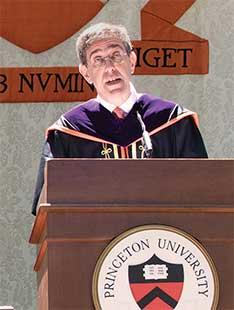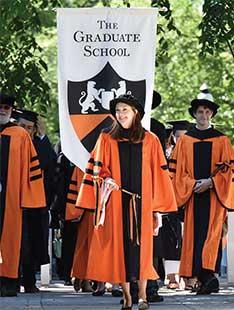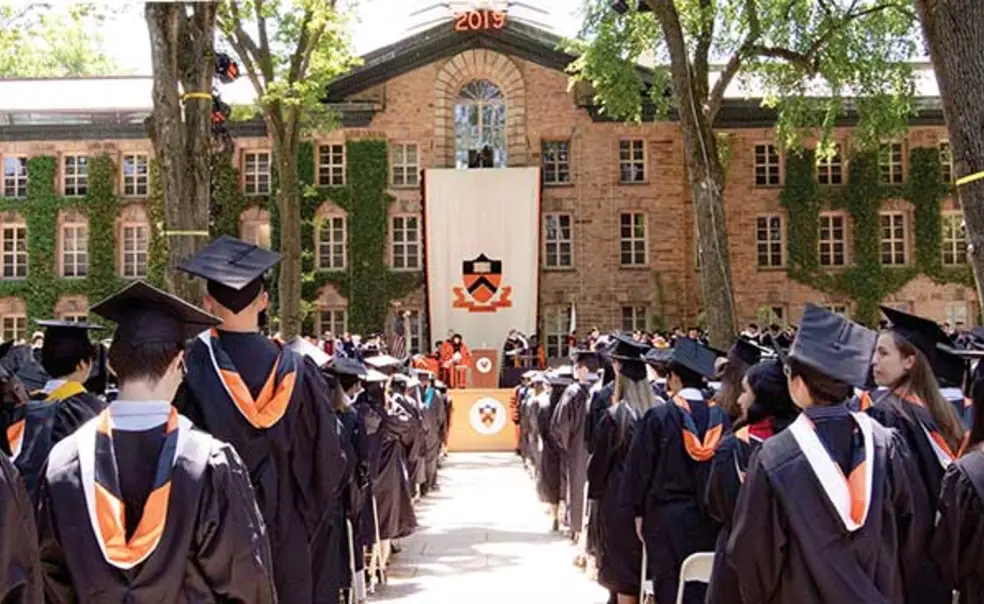Civil Virtues

On June 4, 2019, I had the great pleasure of presiding over Princeton’s 272nd Commencement and my sixth as president. On a glorious late spring day in front of Nassau Hall, I congratulated all of our graduates on their achievements and urged them to use their Princeton education to help restore civil virtues to the public square.—C.L.E.
In a few minutes, all of you will march through FitzRandolph Gate as newly minted graduates of this University. Before you do, it is traditional for the University president to say a few words about the path that lies ahead.
This valedictory ritual is at once utterly common and manifestly artificial. If I or other speakers had sage insight into the wisdom required to navigate life’s unpredictable and sometimes tragic challenges, I guarantee you that we would have shared it long before now. That, I suspect, is one reason why most graduation speeches, with rare and glittering exceptions, are little noted when delivered and quickly forgotten thereafter.
And if the ritual graduation speech is artificial under any circumstances, it seems all the more so at the conclusion of a reunions and commencement weekend when political contention occasionally flared amidst the academic calendar’s most joyous festivities and celebrations. These local events reflect the mood of the country and indeed much of the world. Ours is an ill-tempered time, one that leads some thoughtful observers to worry that we as a country are losing the capacity to disagree respectfully and civilly with one another.
Bitter scrutiny is now almost inevitable for anyone who voluntarily enters public life, and increasingly it extends also to some who never sought the world’s attention. People just going about their lives, doing hard jobs or making tough choices as conscientiously as they can, may suddenly find themselves caught in an unwanted spotlight, the target of unproven and hurtful accusations permanently inscribed on the internet’s digital surfaces.

Even school children on a field trip may find themselves consumed by our fevered animosities. Earlier this spring, Covington Catholic High School students interacted with a Native American man at the Lincoln Memorial. A video of the encounter went viral, and the internet made the young boys international symbols of bigotry and racial insensitivity. When a more complete and complex story emerged, the students’ defenders rushed, with some justification but too much glee, to condemn those who had circulated the original video before they knew all the facts. Nobody involved emerged unscathed. This unhappy chain of events began, ironically, in the shadow of a national monument inscribed with counsel frequently quoted but rarely heeded in our society: “With malice toward none, with charity for all…”.
The firestorm generated by the confrontation at the Lincoln Memorial was especially intense but the basic pattern is all too familiar. Our politics has become hostage to an angry and accusatory culture, in which people too often prefer to issue provocations or denounce opponents, rather than engage in the vital civic work required by deliberative processes that are fair and inclusive to multiple interests and points of view.
Many observers have speculated about the sources of our anger, but I will leave the analysis of causation for another time. I want instead to focus on a reason for hope about society’s future, and your own.
Although the angriest people in our society may be the most noticeable, I am confident that they are not the most numerous. Most people aspire to treat others decently, not to denounce them. I have gotten to know many of you over your time here, and I know that you have the capacity and the values required to engage constructively across even very heated disagreements.
So, while I cannot pretend to have any magical guidance to prepare or protect you for the path that lies ahead, there is one piece of advice that I hazard to offer as you leave this campus: you are moving into a world in which civic norms crucial to our shared political life are fraying. Your generation’s ability to address the world’s problems will depend on, among other things, your capacity to nurture and repair those norms. If ever there was a time when quiet, everyday virtues such as civility, truthfulness, due process, and moderation could be taken for granted, that day is gone.
These civil virtues are neither glamorous nor exciting. They require us to respect others rather than draw attention to ourselves. They are quiet rather than dazzling. Yet, quiet though they may be, these virtues are also the indispensable foundation for any democratic society in which people seek to learn from one another and to pursue a common good that unites them across differences. If you want a society that has the capacity to make real and lasting progress on issues of consequence, you will need not only to live those values but also to speak up bravely on their behalf.
Your education at this University, in its classrooms and beyond them, has given you the resources to defend the civil virtues and to provide the service, citizenship, and leadership that our world so needs. I urge you to take up that challenge along with the others that await you on the path beyond FitzRandolph Gate. As you begin that journey, all of us on this platform wish you well. Whether you receive today a doctoral degree, a master’s degree, or an undergraduate degree, we hope that you will return often to Old Nassau and consider this campus one of your homes. We will welcome you then as we cheer you today, wishing you every success as Princeton University’s great class of 2019! Congratulations and best wishes!












2 Responses
F. Paul Brady *60, retired professor of physics, UC Davis
6 Years AgoSnuffing Out Civility
In his 2019 Commencement address, President Eisgruber urged graduates "to use their education to help restore civil virtues to the public square." He noted: "We as a country are losing the capacity to disagree respectfully and civilly with each other."
However, should not this civility begin on college and university campuses?! They used to be bastions of free speech and venues to present new or controversial ideas, not always widely shared. This has been largely snuffed out by violent campus protests initiated by leftist elements of what is supposed to be a democratic party! All this appears to have greatly increased after Hillary Clinton lost the presidency.
A popular Yale University lecturer resigned due to protests over her Hallowe'en-costume-related comments. The violent mob of leftist protesters who blocked conservative speakers at Middlebury and UC Berkeley (several times) are reminiscent of the Nationalsozialische (NAZI) Brownshirts.
Students and faculty blocked entrances and prevented conservative commentator Heather MacDonald from speaking on the Claremont-McKenna College campus.
The large fraction of faculty leaning-left apparently extends nationwide to whole campuses, and students follow their lead in opposing conservative speakers or visitors. This is very discouraging, and risky for campuses and for the proper education of students who will face a diversity of views in the real world!
Here at UC Davis, it was not possible to invite speaker John Christy, a distinguished professor of atmospheric sciences, who pioneered satellite measurements of global warming. Faculty committees said he was biased, apparently because his measurements, which were widely verified, did not agree with climate-model predictions. The latter, widely used by the alarmist climate establishment and leftist media, predict a warming rate 2.5 times the measurements! NAS, Vol. 32, 2019, has deemed climate studies the most politicized science!
Norman Ravitch *62
6 Years AgoDon't Tolerate Leftist Intolerance
Just because many of us are currently troubled mostly by the incivility of Trump and his deplorable supporters, there is no reason to be tolerant of leftist intolerance. It began in the 1960s with the protests against the Vietnam war and has continued, more or less, depending on public issues, right into the present. Many not on the left have been marginalized. Many in the center left have also been marginalized as too timid and too much worried about attracting Republican voters. Incivility is common enough. Not as bad yet as the university environment in Weimar Germany, where for many years before 1933 nationalistic and anti-Semitic professors and students ruled the roost. Much the same occurred in the Poland of the Colonels, in Horthy's Hungary, in Dollfuss' Austria and elsewhere. In Stalin's Russia, of course, the same thing happened in reverse: Critics were marginalized, when they were not sent to the Gulag or simply shot in the back of the head.